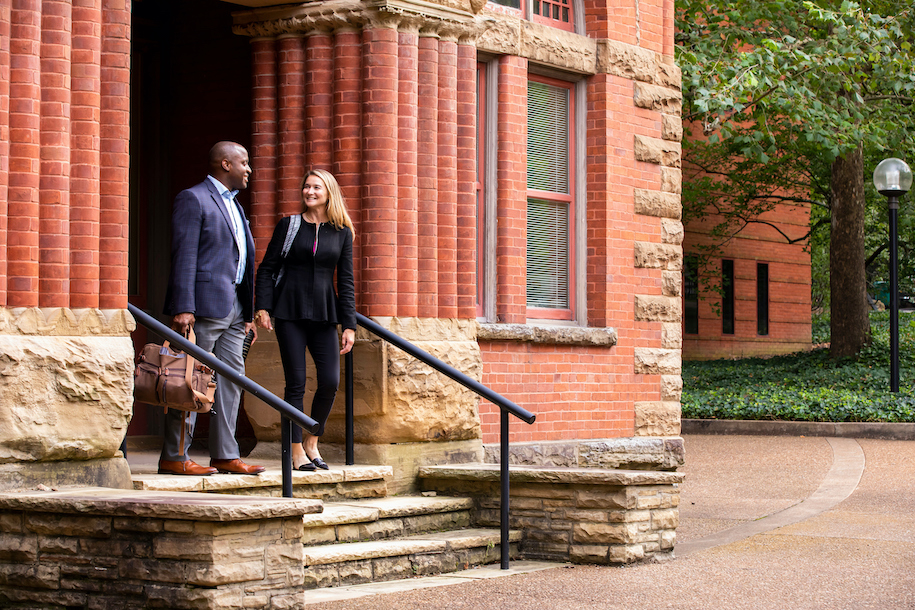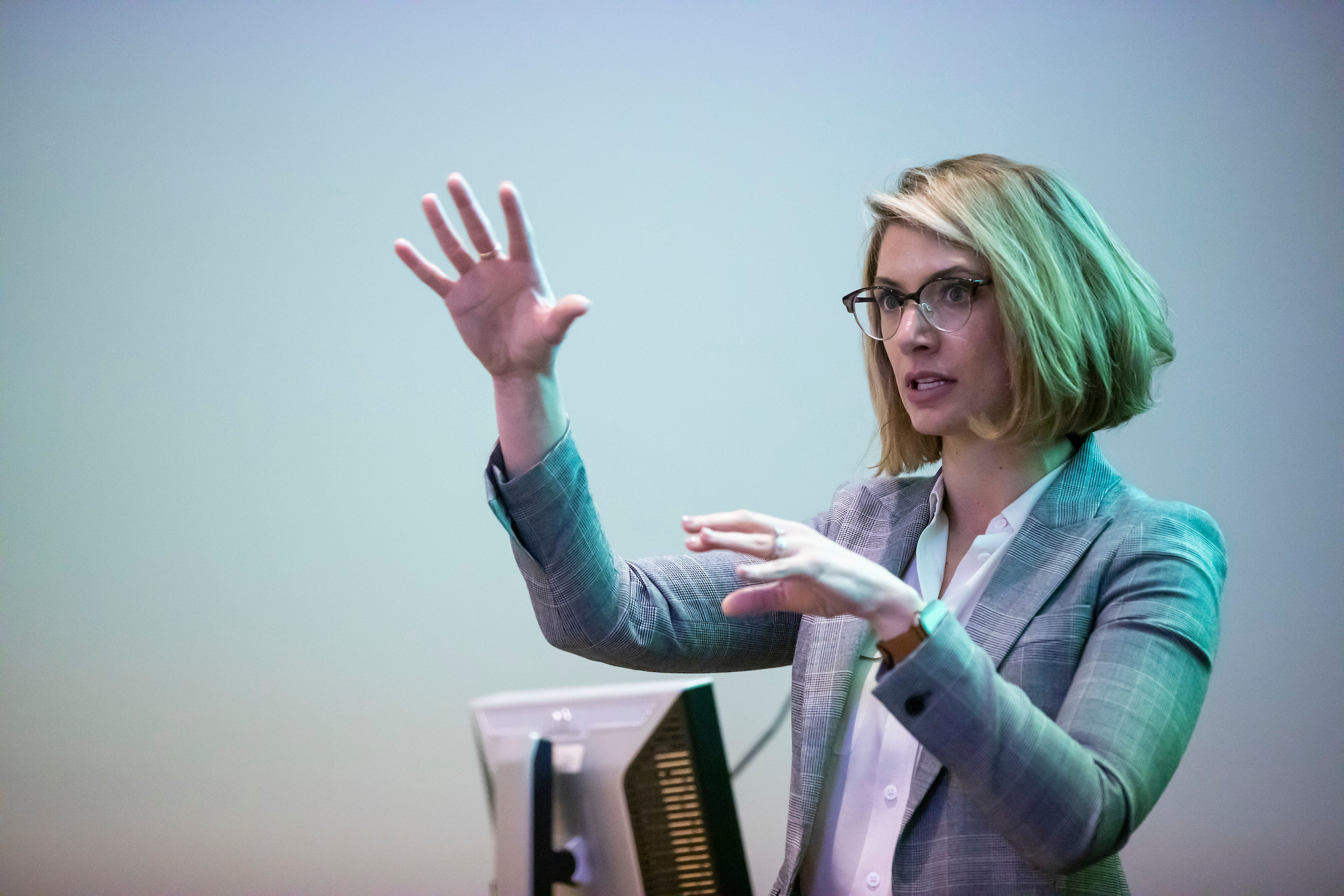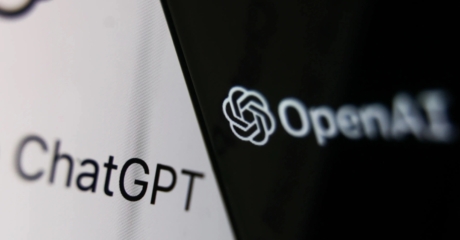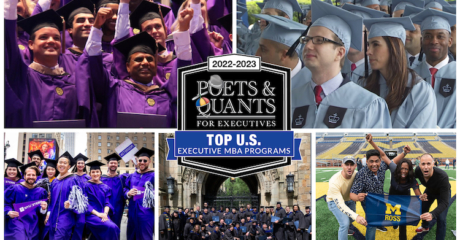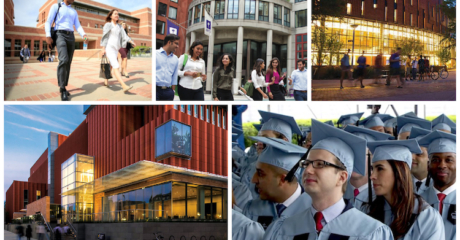Cheryl Hunter became an Engineering Manager at Electrolux without having had formal training in engineering. But Hunter is not alone — she is like many who end up working in a different role than intended. She graduated with a degree in Communications and Public Relations, and being in that role she felt limited without training in the engineering world.
“I wanted to get my EMBA to fill in some of the gaps I had in my understanding of the business elements and how it all fits together,” she says.
Hunter was initially intimidated by the idea of being in the Executive MBA environment, especially the community at Vanderbilt. “Going in, I, and I believe many of the others, had moments where we weren’t sure we belonged. It’s intimidating to be with world class professors in a world class setting.” But it didn’t take her long to feel like she belonged.
She visited the University and spoke with the directors, and in what could be described as a Cinderella style moment where the shoe fits perfectly, she could tell the program would be a perfect fit for her.
Hunter notes, “Because of its prestigious reputation, I expected the culture to feel more pretentious but everyone is so accessible, transparent, and highly interested in your personal life.”
A 40-YEAR HISTORY
Vanderbilt University’s EMBA is one of the first 50 programs of its kind globally, graduating its first class in 1981. The university is located in Nashville, Tennessee, a city renowned for its healthtech industry and entrepreneurial spirit. Vanderbilt’s EMBA is designed to be an immersive in-person experience with emphasis on creating opportunities for the cohort of 50 to connect and collaborate with each other as well as professionals in local and international organizations.
The program typically attracts executives with 10-12 years of experience going through a shift in their career. “For someone who has already established their role at a company, for example a marketing manager 10 years into their role, this EMBA will help them break out of that track and pivot into a different career. It also helps those who have shifted roles and need to understand business in a different way,” says executive director Juli Bennett.
The program isn’t what Hunter would consider easy. “The bar is high at Vanderbilt. They give you the tools that you need in order to meet the bar, but the bar is high.”
The program requires 56 credit hours, and students graduate in less than 2 years (21 months).
Students meet on campus every other Saturday for their first year and take typical business courses such as Accounting, Operations, Marketing, and Organizational Behavior. Business Fundamental courses make up their first year, and strategic courses make up their second year.
Hunter says personally her favorite two courses were Strategy with Brian McCann, and HR Strategy with Nancy Abbott. These courses tied up some loose ends and she realized why she wanted to get her MBA.
Executive students choose from one of two tracks in their second year: the Executive Edge Track which attracts 75% of students, and the Global Immersion Track which attracts 25%.
GLOBAL IMMERSION
Now living in Charlotte, North Carolina, Hunter committed to the Executive Edge Track because she had previously been exposed to global business in her role at Electrolux. She wanted a consistent and relatively local schedule for all 21 months. In the Executive Edge track, students meet at Vanderbilt every other Saturday for the duration of the program, with the exception of a few immersion experiences. The local immersions take place in Indiana and Nashville, and a one-week international immersion takes place their second year in varying locations where students experience international business in a foreign context.
Vanderbilt’s Global Immersion Track has a substantial amount of international travel the second year. “Students who have been in this track have nothing but great things to say about it,” says Hunter but for her, she had already had global business exposure and taking the time off of work to attend the immersions would have proved difficult.
In this track students attend four nine-day residencies with 3 partner schools in a traveling cohort of around 60 executive students. At partner school Simon Fraser University in Vancouver, Canada, students learn cross-cultural awareness and global strategy. At FIA in Sao Paulo, Brazil, they learn marketing and sustainability. At Itam University in Mexico City, Mexico, they study family business and global pricing strategy. The cohort finishes at Vanderbilt, where they learn Innovation and complete capstone projects.
The students are carefully placed in teams of 4-5 in a “C-Team” model, meant to simulate a C-Suite environment. The intention is to bring diversity to the table and challenge ways of thinking, mixing executives of different experiences such as Marketing, HR, IT, Operations, and Finance together. Bennett says, “The teammates in the C-Teams challenge each other and learn to think in different ways and from different perspectives. Working in a team is not intended to be easy, but it’s part of the growth experience.”
YEAR 2
In year two, both tracks culminate in the Capstone Strategy Project course where students act as consultants for an existing business. In this challenging course they navigate complexity, using all they have learned to advise the business on a 5 -10 year strategy. Executive Edge students typically consult a local client, whereas the Global Immersion students consult a large global company which comes with the added challenge of navigating cross-cultural barriers.
Both tracks take a unique “Creating and Launching the Venture” course. In this course, each C-team crafts a product or service to go to market with, and quite like Shark Tank, they present in front of 12-14 venture capitalists who decide whether or not they’d invest in the product. For the course, the products and services are theoretical but can turn practical. Actual deals have been made between students and venture capitalists. Each track runs this course on separate timelines; for the Executive Track it’s a ten-week course, and for the Global Track it’s a ten-day course.
Tuition costs $60,750 per year, a good deal considering the program is all-inclusive therefore stress relieving, with directors and staff arranging schedules, immersion housing, and course materials for them. The academic community designed the program this way, understanding students are performing balancing acts of work, family, and school life. The tuition rate is held flat for students’ second year which allows students to plan and manage their finances ahead of time.
The program requires a minimum of five years of working experience, an assessment of some form, and an interview. Typically, 75-80% of applicants take the Executive Assessment administered by the GMAC (Graduate Management Admission Council), the same organization that administers the GMAT exam. About 10% take the GMAT, and the remaining 10% apply with GRE scores. Vanderbilt also requires interviews to gauge prospective students’ probability of success in the program. “Something we look for in an EMBA candidate is that the person is in a position of influence in order to implement the things that they learn in the program,” says Bennett.
A GREAT ROI
Vanderbilt’s Leadership Development Program (LDP) is what Bennett says to be one of the most transformational components of the EMBA. “It is a fantastic opportunity for students to step back and think strategically about who they are and what they ultimately want as the outcomes of their career,” she says.
In LDP, students will work with 3 types of coaches to assess their career goals, looking at where they are now to where they want to be. The Executive Coach assists students in exploring their interests and helps open up new paths to career opportunities. The Career Coach helps students strategize on how to land their desired position. The Team Coach helps C-Teams elevate their performance and leverage their skill sets to perform at their best.
During their time in the program, EMBA students often get involved with the Wond’ry Innovation Center, the Center for Social Ventures, and the Center for Entrepreneurship.
As well as getting a great ROI (return on investment), students will get a ROE (return on education), considering they will achieve a better earning potential, obtain a greater foundation for business knowledge, develop leadership skills, gain access to career development resources, and have endless opportunities to connect with the alumni network.
Bennet says each year someone from each cohort emerges as the informal social chair, and the cohort often has happy hours and dinners together every immersion. “Many of the students are so closely bonded with each other, and still go on family vacations together.” Hunter became very close with her cohort. “They are still without a doubt some of my favorite people on the planet,” she says.
COMMITMENT TO DIVERSITY
Vanderbilt is committed to diversity and inclusion, encouraging all to apply. They support the Yellow Ribbon program for military personnel, are partners with the ROMBA organization supporting the LGBTQIA community, and support women through the Forté foundation. The EMBA also places importance on bringing the nonprofit voice into the room, and they give one full tuition scholarship to a nonprofit executive every year.
Hunter advises interested applicants to take the leap if they are considering applying. “You might always be looking for the perfect time or the perfect moment. There will always be a million reasons why not or a million obstacles in the way.”
As a result of earning her EMBA, Hunter says she feels more comfortable in her current role as Sr. Manager of Product Planning and Innovation at Electrolux. “I grew so much. I expected to come to Vanderbilt and be able to understand the answers, and that’s not how it works. You instead have more knowledge and gain the confidence to say ‘well it depends’.”





